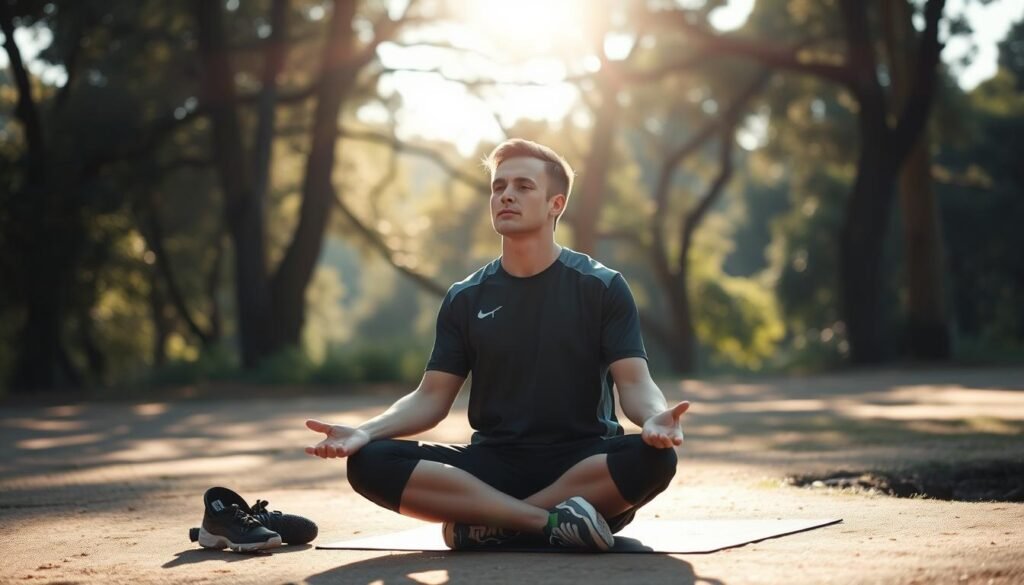About 30% of athletes deal with performance anxiety when competing. This challenge affects both professionals and amateurs. To overcome it, understanding and managing sports anxiety is key. It helps to improve mental toughness and performance.
In this piece, we’ll share expert advice on handling performance anxiety. Athletes will learn how to thrive under pressure. By recognizing symptoms, pinpointing causes, and using effective methods, they can boost their confidence and resilience. Stress management techniques tailored for athletes are crucial.
Key Takeaways
- Performance anxiety impacts many athletes, affecting how well they do.
- Common signs are a fast heartbeat, tight muscles, and shaking.
- Having self-confidence is key to handling anxiety well.
- Regular practice and getting ready can help ease sports anxiety.
- Using mindfulness and imagining success work well in competition.
- If anxiety is too much, finding a professional to talk to is important.
Understanding Sports Anxiety
Sports anxiety is crucial for athletes wanting to do better. It’s also called performance anxiety. It shows up as too much worry or fear before or during events. Up to 60 percent of athletes might feel this, showing it’s common.
Teen athletes often face more anxiety than adults. A 2018 study found this to be true. It also said girls feel anxiety more than boys. This suggests young female athletes need extra support to handle stress.
There are different ideas about performance anxiety. The inverted-U theory says a little anxiety can improve performance. But too much can make it worse. Other theories look at how anxiety affects how well athletes do. They consider thoughts, physical feelings, and actions.
Dealing with sports anxiety includes helpful steps. A study showed that talking to oneself positively helps junior athletes feel more confident. Meditation can also lower anxiety, helping athletes stay calm and focused.
Knowing about sports anxiety shows athletes it’s okay to feel pressured. By building mental strength, they can get ready better for contests. This can help improve how well they perform.
Symptoms of Performance Anxiety
Performance anxiety shows up in different ways. It affects folks in sports, music, and public speaking. Athlete stress is common during big events, causing mental and physical symptoms.
- Physical Symptoms: These include a fast heartbeat and breathing quickly. You might get a dry mouth and tight throat. Your hands and knees may shake. Sweaty and cold hands are also common. Some people feel sick or have stomach trouble.
- Cognitive Symptoms: Thinking negative thoughts and having trouble focusing can mess up your game. You might worry too much about failing or what others think.
- Emotional Symptoms: Feelings of not being good enough are typical. The fear of disappointing others can make you less confident during your event.
About 20% to 34% of top athletes get performance anxiety. And 50% to 70% of pro musicians struggle with it too. This worry usually pops up before a big performance. We need to understand it and learn how to manage it.
Knowing about these mental symptoms helps athletes spot when they’re anxious. Then, they can try coping strategies to fight athlete stress in contests. Deep breathing, thinking positive thoughts, and meditation help. Cognitive Behavioral Therapy (CBT) is also a strong tool. It can boost your performance and make you mentally stronger.
Causes of Sports Anxiety
Sports anxiety comes from many places and touches athletes of all ages and skills. Young ones especially feel the heat to do well. They fear failure and letting others down, feeding their anxiety. Being worried about what peers think adds to their stress.
Those new to a sport get anxious about their skills, more so if the sport is new or the rivals are tough. Moving up to pro levels brings doubts and more nerves. Even pros face stress over keeping up their game, dealing with aging, and juggling life.
Where they perform matters too. Big crowds or new places can make stress worse. The Diagnostic and Statistical Manual of Mental Disorders mentions anxiety lasting six months or more is serious. It goes beyond normal nerves and can hurt how one performs, in sports and life.
Anxiety shows up physically too, changing heart rates, causing short breaths, nausea, and tight muscles. This messes with an athlete’s focus and calm. It might make them too cautious or skip parts of their sport. Or, they might overtrain to beat anxiety, risking injury.
| Cause | Description |
|---|---|
| Fear of Failure | Young athletes worry about disappointing coaches, parents, and peers. |
| Social Pressure | Concerns about judgment from teammates and spectators enhance self-consciousness. |
| Lack of Experience | New athletes feel anxious when facing skilled opponents in unfamiliar situations. |
| Performance Location | Competing in front of large crowds can elevate stress and anxiety levels. |
| Increased Responsibilities | Balancing sports with personal or academic obligations can contribute to athlete stress. |
Knowing why athletes get anxious is key to helping them. With the right support and methods, they can deal with stress. They can stay focused, feel sure of themselves, and perform at their best.
Normalizing Anxiety in Athletics
Anxiety in sports is crucial for athlete’s health and their performance. Athletes often feel anxious, showing up as sweating or faster heartbeats. Knowing that performance anxiety is common helps them deal with these feelings better.
Coaches and parents are key in making athletes feel supported. They explain anxiety like having “butterflies” in one’s stomach. This openness helps with mental health, builds a support system, and fights stigma.
Athletes benefit from having a routine before competing. This can include seeing the event in their mind and deep breathing. These methods help control anxiety and improve focus and concentration.
Practices like “Belly Breathing” are very helpful. They are relaxing and prepare young athletes to face pressure.
Many families watch big events like the Olympics. This sparks a lot of children’s interest in sports. It’s important for parents to help their kids manage sports anxiety. A strong network of coaches, teammates, and mental health professionals is very helpful.
If athletes feel too anxious, they should consider seeing a sports psychologist. Such help can improve their performance and happiness. Making anxiety normal, talking about it, and supporting mental health is key in sports. For tips on handling performance anxiety, read this informative resource.
Practical Techniques to Manage Sports Anxiety
Many athletes deal with competition anxiety due to pressure to win or high expectations. They can ease tension and improve by using practical techniques.
Seeing anxiety as excitement is one effective way. This helps athletes face challenges positively. Keeping the same routines before competitions creates security and focuses the mind. Having a pre-game plan also keeps athletes focused and prepared.
Breathing exercises are key for stress management. Deep breaths help lower heart rates and clear the mind for competition. Using Progressive Muscle Relaxation (PMR) reduces muscle tension from anxiety. Mantras and affirmations strengthen a positive mental state.
Listening to music before events can calm nerves well. Support from family, friends, and teammates also lessens anxiety.
| Technique | Description | Benefit |
|---|---|---|
| Deep Breathing | Controlled breathing exercises | Lowers heart rate and clears the mind |
| Progressive Muscle Relaxation | Systematic tension and relaxation of muscle groups | Reduces muscle tension and promotes relaxation |
| Positive Self-Talk | Affirmations and encouraging thoughts | Enhances confidence and positive thinking |
| Pre-Competition Routine | Establishing a consistent set of activities | Helps athletes feel prepared and less anxious |
These techniques give athletes tools to manage their emotions. For more insights, athletes can check out this article. With the right strategies, sports anxiety becomes a manageable part of competing.
Mindset Training for Athletes
Mindset training is crucial for athletes who want to perform better in competitions. It teaches athletes to see anxiety as something positive. Instead of worrying about what might happen, they focus on what they can do.
Cognitive reframing is key here. It helps athletes view anxiety as a sign of their dedication and readiness. This change in perspective makes them more resilient. It turns their nervous energy into a powerful force for good performance.
The Performance Pyramid is a model that shows how mental skills matter in sports. It guides athletes through nine mental skills that boost success. These includes:
- Attitude
- Motivation
- Goals and commitment
- People skills
- Self-talk
- Mental imagery
- Dealing effectively with anxiety
- Dealing effectively with emotions
- Concentration
Top athletes focus on staying positive and setting goals. They know how to handle their emotions and not let anxiety win. Concentration is crucial. Athletes must ignore distractions and keep their eyes on the prize during contests.

Mindset training is all about regular practice. Using techniques like visualization and positive self-talk strengthens the mind. Making these practices daily routines builds mental toughness over time.
Confidence is the foundation of great performance. Athletes with strong mindsets are more focused, driven, and tough. So, mindset training is essential for those aiming for the top in their sports.
Confidence-Boosting Strategies
Building confidence is key for athletes facing performance anxiety. Several strategies can help support athletes to do their best. Support from coaches, family, and teammates creates a winning environment.
Preparing well and setting goals are crucial. They give athletes control and focus. Setting both performance and process goals helps. It allows them to focus on the task at hand. Small wins build confidence. Practice and competition offer mastery experiences. This improves self-confidence and mental toughness.
Positive self-talk is a strong tool. It fights off negative thoughts that can lower confidence. Talking to oneself in a motivating way can lessen anxiety. It boosts confidence and performance. Visualization also helps athletes prepare mentally, making them ready and confident.
- Prioritize consistent training to build confidence through mastery experiences.
- Utilize positive self-talk to diminish negative thinking patterns.
- Engage in visualization exercises to enhance mental preparedness.
- Seek athlete support from coaches and teammates for encouragement.
- Set achievable performance goals to maintain a clear focus.
Studies show confidence affects performance, especially in short-duration sports. Confident athletes tend to do better. Using these strategies can help athletes handle competition pressure. They won’t let anxiety lower their potential.
These strategies really work, as seen in real-life athlete stories. For more on boosting confidence, check out this informative resource.
Stress Management Techniques
In the world of athletics, handling stress well can really improve performance and well-being. Many techniques help reduce stress and let athletes excel in competitions. It’s key to know and use these methods for a good balance in sports.

Positive self-talk is a crucial technique. It helps athletes gain confidence and change their mindset, fighting off stress. Along with this, visualization helps. Athletes picture success, boosting their winning spirit. This approach shifts focus from stress to reaching goals.
Using relaxation methods, like deep breaths, helps too. It lets athletes ease body tension. Knowing signs of stress is important. For example, getting at least eight hours of sleep fights off stress. Not enough rest can make stress worse and hurt performance.
It’s vital to balance sports with self-care. Eating well and relaxing activities are important. Student-athletes often deal with extra stress from coaches and parents. Talking about these pressures can help find a better balance.
Dr. Steve Graef from The Ohio State University Wexner Medical Center talks about the P.E.R.F.E.C.T way to cope.
| Letter | Technique |
|---|---|
| P | Positive Self-Talk |
| E | Embrace Adversity |
| R | Reverse Engineer |
| F | Focus on the Now |
| E | Evolve |
| C | Chill Out |
| T | Talk It Out |
These tips help athletes stay strong and keep a healthy mind. Doing fun things and getting advice from friends or mentors can lower stress. It lets athletes keep a positive view throughout their sports journey.
The Role of Preparation in Reducing Performance Anxiety
Preparation is key for athletes wanting to beat performance anxiety. Studies show it affects about 30% of athletes. This highlights why it’s so important to find effective ways to handle it. Practicing a lot makes athletes more familiar with what they do. It also makes them more confident.
Setting goals you can actually reach is very important. Your plan should cover being ready both in body and mind. This helps athletes concentrate not just on skills but also on imagining success. Using guided imagery can reduce anxiety symptoms by 25%. Saying positive things to yourself can also make you 15% more confident before a game.
Trying different training methods besides your main sport can lower stress. Athletes who do cross-training find new ways to stay active. This makes them feel better overall. Eating well is also critical. A diet full of nutrients can improve your mood and lower stress, helping to ease anxiety.
In the end, the right preparation gets your mind and skills on the same page. It lays a strong foundation for doing well. Working with sports psychologists has helped pro athletes become 30% more resilient. This shows how vital mental preparation is in overcoming performance anxiety.
| Preparation Techniques | Benefits | Impact on Performance Anxiety |
|---|---|---|
| Goal Setting | Enhances focus and motivation | Up to 25% performance improvement |
| Guided Imagery | Visualize success effectively | 25% reduction in anxiety |
| Positive Self-Talk | Boosts confidence | 15% increase in mental strength |
| Seeking Support | Professional guidance from sports psychologists | 40% reduction in anxiety symptoms |
| Diverse Practice | Engages different muscle groups | Reduces overall stress levels |
| Balanced Diet | Supports mood and energy | Positive effect on anxiety management |
Visualization and Mindfulness Practices
Visualization and mindfulness help athletes deal with sports anxiety. They imagine successful outcomes, which brings calm and focus. Such exercises use the brain’s pathways, just like during actual sports, helping athletes prepare better.

Mindfulness makes athletes stay present and focus on the now. This reduces distractions and lessens worry about what will happen. Studies show mindfulness improves focus and helps athletes enter their flow state. This state brings deep concentration and sharp awareness.
Using these methods every day can boost mental sharpness. Athletes visualize winning and use guided meditation to ready themselves. They imagine being in the competition, touching gear, and hearing fans. This makes them more involved in their sport.
- Visualization exercises increase motivation and build a winning mindset.
- Mantras, or positive phrases, combat negative thoughts and keep focus strong.
- Imagining victory helps athletes break through barriers.
- Mindfulness before competitions enhances performance.
Visualization and mindfulness given daily attention give athletes a mental advantage. It sharpens focus, builds resilience, and ups their game. Adding these methods to training reduces stress and betters mental strength. All these prepare athletes for success when it’s most important.
Seeking Professional Help for Severe Anxiety
For athletes with severe anxiety, getting professional help is key. They should engage a sports psychologist. This expertise is critical for managing anxiety and improving mental health.
Severe anxiety can show up in many ways. Athletes may feel nervous, have racing thoughts, or even show physical signs like a faster heartbeat. These can all lower their ability to perform well.
Working with mental health experts helps athletes find what causes their anxiety. The path to recovery may have ups and downs. Yet, support from a skilled professional helps them deal with challenges. They learn strategies in therapy that help them make progress in recovery.
It’s important for athletes to have a safe space where they can share their feelings. The people around them should also take care of their mental health. This support makes it easier for athletes to improve. Seeing a professional helps athletes understand themselves better and make personalized plans to reduce anxiety.
| Type of Professional | Role | Benefits |
|---|---|---|
| Sports Psychologist | Focuses on mental strategies for performance enhancement | Personalized techniques to manage anxiety |
| Clinical Psychologist | Treats mental health disorders | Identifies underlying issues contributing to anxiety |
| Counselor | Offers support and guidance | Helps with coping mechanisms and stress relief |
| Licensed Social Worker | Connects individuals with resources | Provides holistic support for recovery |
Getting professional help is a key step for athletes to beat severe anxiety. Working together with mental health professionals greatly improves their performance and life quality.
Conclusion
Overcoming sports anxiety helps athletes perform better and enjoy their sport more. Athletes can manage their anxiety by using strategies like visualization, mindfulness, and structured preparation. These methods build mental strength and confidence. This empowers them to approach competitions positively.
Research with 171 professional athletes shows that coping strategies are vital. Being coachable and motivated helps athletes deal with the ups and downs of sports. Understanding these factors allows athletes to create coping strategies that work for them. This helps them to be mentally strong.
Regular physical activity also helps reduce anxiety. It triggers endorphins, boosts mood, and improves sleep. By staying active, athletes can lower their anxiety. This lets them concentrate on their love for sports without being overwhelmed by worry.